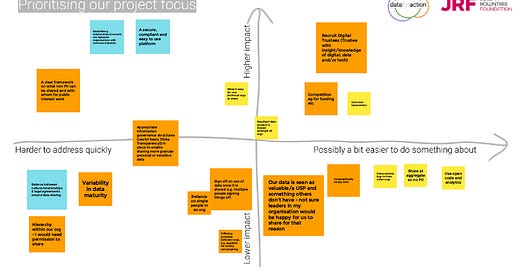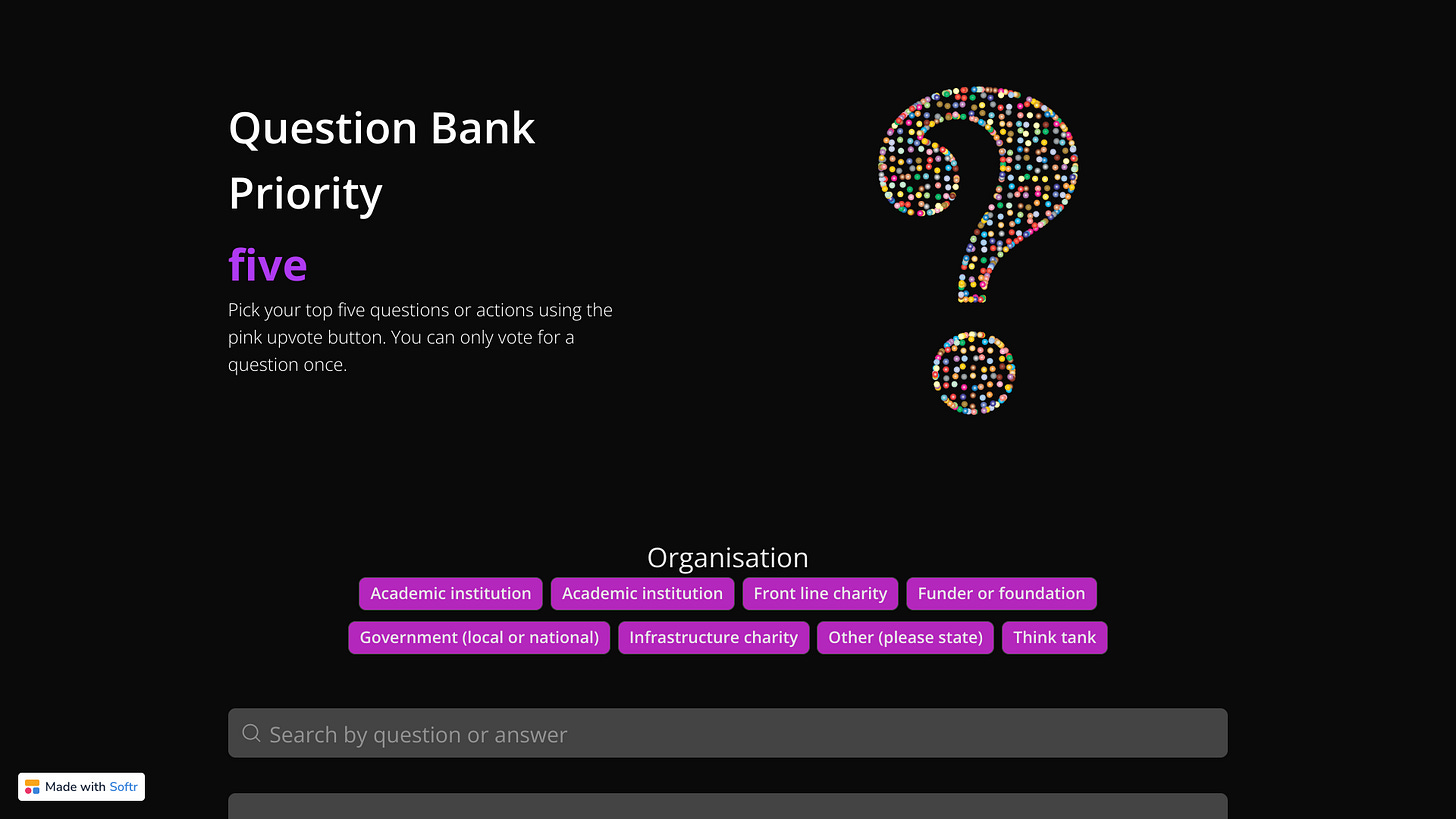Infrastructure for data sharing workshop #1
What we did, how you can still contribute more and what’s next…
What happened at the workshop?
On Thursday 13th July 2023 we held our first workshop as part of our role in the JRF Insight Infrastructure programme. There were approximately 25 attendees from charities and civil society organisations. There was a range of national, regional and local organisations with different foci when it comes to thinking about poverty and its related issues. Here are the Slides from the workshop.
We started by focusing on the questions people had in relation to poverty in the UK. People added their questions to the Question Bank, our first prototype of the project so far!
Once we had added some questions, we asked people to prioritise the five most important to them by ‘upvoting’ the questions here.
We then split into four smaller groups. Each group chose one or two of the high priority questions from the previous activity as the basis for answering the following questions:
What have we each got that could contribute to answering one or more of the priority questions?
What do we know that we need from others that could contribute to answering one or more of the priority questions?
What enables you - or would enable you - to contribute the things you have?
What prevents you - or would prevent you - from contributing the things you have?
If addressed, which opportunities and barriers would be most impactful?
Which opportunities or barriers feel easiest to do something about first?
What did people say?
Thoughts from each of the groups were captured in the following Jamboards:
How can I contribute now?
Continue to add questions to the Question Bank. This will remain open for the rest of the project…and possibly beyond!
Follow the workshop structure above and add your thoughts into this Jamboard, which we will leave open for a few weeks. Please note that this is a public facing document.
If you are aware of any useful things that may contribute to our understanding of available and existing ‘infrastructure for data sharing’ please feel free to submit them here.
What’s happening next?
The project team will spend some time organising the themes from the workshop and subsequent input. We will share these themes publicly and encourage responses to them.
These themes will form the platform for a series of workshops in the autumn where we all experiment with and develop possible ways to respond to them. This is the ‘prototyping’ phase of the project and there may be opportunities to support charities and civil society organisations to try things out.
Watch this space…
How can I be updated more regularly?
Easy!
Pop your details in this form.
Read our stuff on Substack.
If you’d rather have a chat, email hello@dataforaction.org.uk and we’ll sort something out.
A bit more detail on the project background from JRF
At JRF, we are currently developing a new insight infrastructure which aims to generate and disseminate better and timely insights into social and economic inequalities. Acting as a satnav, the insights we aim to generate in open collaboration with others will provide a series of possible routes to navigate from problem to solution. Such routes will be the result of triangulation of data from different yet trusted sources.
It is with this mindset that, before building any sets of resources and tools, we have spent time listening to and improving our understanding of the ecosystem we plan to support, inspire and work with. In addition to providing us with a clear sense of what ‘consumers of data and insight products’, partners and contributors might see as an ideal infrastructure, we have co-created a series of key principles guiding our work.
As we develop and prototype models and approaches for the generation and dissemination of such insights, we are keen to investigate the role that data collected by charities could play. Such information is one of the closest to real-time insights into the socio-demographic characteristics of the many people and households in need across the country.
Working in partnership with Data for Action, we’ve set to investigate what it would take for data collected by charities to become an accessible and usable asset, for the sector first and foremost, and for it to inform proactive service provision and grant-making; create the conditions for data-driven, evidence-led decision making; and shed a light on the crucial and extensive contribution, often taken for granted or unaccounted for even, charitable organisations make to the lives of those excluded, left behind, and society overall.





